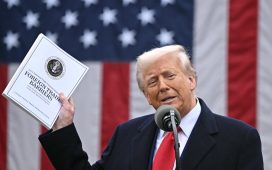Trump says China ‘totally violated’ tariff truce
Donald Trump has accused China of breaking the tariff truce the two nations agreed in Geneva just a few weeks ago.
Both countries had agreed to temporarily pause their escalating tariffs, which at one point hit 145%.
The president wrote on his social media platform Truth Social:
I made a FAST DEAL with China in order to save them from what I thought was going to be a very bad situation, and I didn’t want to see that happen. Because of this deal, everything quickly stabilized and China got back to business as usual. Everybody was happy! That is the good news!!! The bad news is that China, perhaps not surprisingly to some, HAS TOTALLY VIOLATED ITS AGREEMENT WITH US. So much for being Mr. NICE GUY!
Trump did not specify how China had violated the agreement, though his comments mark an escalation in tensions between the two biggest economies in the world.
Jamieson Greer, US Trade Representative, said in an interview with CNBC that the Trump administration has “been very focused on monitoring Chinese compliance, or in this case, noncompliance, with the agreement.”
Greer noted that critical minerals was one area of particular concern. He said:
We haven’t seen the flow of some of those critical minerals as they were supposed to be doing…China continues to, you know, slow down and choke off things like critical minerals and rare Earth magnets.”
Key events
Closing post
Time to wrap up….
Trade tensions are ramping up again between the US and China, with Donald Trump accusing Beijing of breaking the tariff truce the two nations agreed in Geneva just a few weeks ago.
Both countries had agreed to temporarily pause their escalating tariffs, which at one point hit 145%. But on Friday the president wrote on his social media platform Truth Social that “China, perhaps not surprisingly to some, HAS TOTALLY VIOLATED ITS AGREEMENT WITH US.”
Though Trump did not specify how China had violated the agreement, Jamieson Greer, US Trade Representative, noted in an interview with CNBC that critical minerals was one area of particular concern. He said:
We haven’t seen the flow of some of those critical minerals as they were supposed to be doing …China continues to, you know, slow down and choke off things like critical minerals and rare Earth magnets.”
US stock markets fell at the open, with the blue chip S&P 500 index down 0.5% in early trading.
My colleague Lauren Aratini has the story here:
Closer to home, Alan Taylor, a member of the Bank of England’s interest rate-setting committee, warned that higher-than-expected inflation and growth figures should not distract policymakers from continuing to cut borrowing costs.
“I’m not going to pre-emptively announce my vote, but I think I indicated in my dissent that I thought we needed to be on a lower [monetary] policy path,” Taylor told the Financial Times in an interview.
Earlier this month the Bank of England lowered rates by 25 basis points to 4.25%, taking it to the lowest level since 2023.
My colleague Kalyeena Makortoff has the full story:
In other news

Lauren Aratani
Donald Trump declared that China has “totally violated its agreement” against the US on trade just two weeks after the countries reached a deal, raising fears that the trade war will continue to rattle the global economy.
“I made a FAST DEAL with China in order to save them from what I thought was going to be a very bad situation,” Trump wrote on Truth Social on Friday morning. “Everybody was happy! That is the good news!!! The bad news is that China, perhaps not surprisingly to some, HAS TOTALLY VIOLATED ITS AGREEMENT WITH US.”
Trump’s post follows comments from the treasury secretary, Scott Bessent, on Fox News that trade talks with China “are a bit stalled”, though he said that there will be more discussions with Chinese officials in the coming weeks. The White House has not offered any specific details on what has stalled trade talks.
US stock markets turned negative after the news. On Friday morning, the S&P was down 0.1% and Nasdaq was down 0.3%.
Read the full report here:
Wall Street’s main indexes fell after Trump’s accusations at China. At 9.59am ET, the Dow Jones industrial average fell 49.27 points, or 0.12%, to 42,166.46, the S&P 500 lost 27.12 points, or 0.46%, to 5,885.05 and the Nasdaq Composite lost 155.75 points, or 0.81%, to 19,020.13.
Most megacap and growth stocks fell, with Nvidia down 2.4%, reports Reuters. Nine of the 11 major S&P 500 sub-sectors fell, with energy and information technology declining the most. Despite the losses, the Nasdaq is on pace for its best month since November 2023, while the benchmark S&P 500 is on track for its biggest monthly gain since November 2024. The Dow is also set to notch a near 3.5% advance for May.
American consumers slowed their spending in April, new official figures show, while imported goods plunged as companies navigated trade tariffs.
Consumer spending rose by 0.2% in April, according to figures from the Commerce Department’s Bureau of Economic Analysis. That compared with a 0.7% rise in March, which was driven by pre-emptive shopping ahead of Trump’s sweeping tariffs on various imports.
Meanwhile the Federal Reserve’s preferred inflation measure – the Personal Consumption Expenditures (PCE) Price Index- rose by 0.1% in April compared with the month prior. Compared with a year earlier, the gauge rose by 2.5%.
Wall Street opens lower after Trump says China violated tariff truce
US stocks have opened lower on Friday after Donald Trump accused China of violating a temporary tariff truce agreed just a few weeks ago.
The S&P 500 blue chip index slipped 0.14% when the market opened, while the Dow Jones Industrial Average fell 0.06% to 42,192.35. Meanwhile the tech-heavy Nasdaq index dropped 0.23%.
Trump says China ‘totally violated’ tariff truce
Donald Trump has accused China of breaking the tariff truce the two nations agreed in Geneva just a few weeks ago.
Both countries had agreed to temporarily pause their escalating tariffs, which at one point hit 145%.
The president wrote on his social media platform Truth Social:
I made a FAST DEAL with China in order to save them from what I thought was going to be a very bad situation, and I didn’t want to see that happen. Because of this deal, everything quickly stabilized and China got back to business as usual. Everybody was happy! That is the good news!!! The bad news is that China, perhaps not surprisingly to some, HAS TOTALLY VIOLATED ITS AGREEMENT WITH US. So much for being Mr. NICE GUY!
Trump did not specify how China had violated the agreement, though his comments mark an escalation in tensions between the two biggest economies in the world.
Jamieson Greer, US Trade Representative, said in an interview with CNBC that the Trump administration has “been very focused on monitoring Chinese compliance, or in this case, noncompliance, with the agreement.”
Greer noted that critical minerals was one area of particular concern. He said:
We haven’t seen the flow of some of those critical minerals as they were supposed to be doing…China continues to, you know, slow down and choke off things like critical minerals and rare Earth magnets.”
Bessent says trade talks between US and China are ‘a bit stalled’
The US trade secretary Scott Bessent said last night that trade talks between the US and China are “a bit stalled” and may need the direct involvement of Trump and Chinese president Xi Jinping.
Speaking to Fox News on Thursday, he said:
I believe we will be having more talks with them in the next few weeks and I believe we might at some point have a call between the president and party chair Xi…
Given the magnitude of the talks . . . this is going to require both leaders to weigh in with each other…They have a very good relationship and I am confident that the Chinese will come to the table when President Trump makes his preferences known.”
Bessent travelled to Switzerland a few weeks ago for talks with Chinese officials, with both sides announcing they had agreed to a 90-day pause on their escalating trade war.
German inflation slows to 2.1% in May
German inflation eased to 2.1% in May, new figures from Europe’s biggest economy show. It marks a deceleration from a rate of 2.2% in April and brings it closer to the European Central Bank’s 2% target.
The inflation reading has come in slightly ahead of forecasts, with analysts polled by Reuters expecting a rate of 2% this month.
Nevertheless, it may strengthen the case for an interest rate cut next week. The ECB is expected to lower rates on 5 June as inflation decelerates and US trade tariffs threaten to slow economic growth.
Here is George Saravelos, a strategist also from Deutsche Bank, outlining how impactful section 899 could be:
Section 899 challenges the open nature of US capital markets by explicitly using taxation on foreign holdings of US assets as leverage to further US economic goals. The parallels with the trade war over the last few months are clear. Numerous issues that are being referenced in the current trade war (eg. Digital Services Taxation) are also part of this legislation.
….The US dollar has fully reversed its gains since the tariff news overnight. From our perspective the market has moved on from the specifics of the trade shock to the broader question of dollar asset allocations. Should the new Section 899 authority be voted in to law, it will do little to ease concerns that these asset allocations are under structural reconsideration.
Trump’s tax bill contains ‘sledgehammer’ to retaliate against tax
Nerves are growing on Wall Street as investors are picking up on an obscure item in Trump’s tax and spending bill: section 899.
The provision would allow the US to impose additional taxes on companies and investors from countries whose tax policies the US judges as “discriminatory”.
Peter Roskam, former Republican congressman and head of law firm Baker Hostetler’s federal policy team, said:
This new Section 899 provision brings a sledgehammer to the idea that the United States will allow itself to be characterized as a tax haven by anyone.
Jim Reid at Deutsche Bank said:
The risk here is that this provides the option to change tax treatment of foreign capital. So if the US wanted to they could pivot some of their attention from a trade to a capital war. Clearly no-one knows but a wounded animal is often a dangerous one…Ultimately if they did pursue this route it would be an added disincentive for foreigners to hold as much US assets.
House sales dropped sharply in April after a surge in buying activity in March, new figures show.
There were 64,680 house sales in April, according to estimates from HM Revenue & Customs. That marks a 64% drop compared with the 177,440 reported in March, as first-time buyers rushed to complete on sales ahead of a stamp duty changes in England and Northern Ireland. It was also 28% lower than 89,860 sales reported in April last year.
However, Richard Donnell, executive director at the property portal Zoopla, said the market still looks resilient.
Our latest data shows a lull in new sales over Easter but a significant pick-up in sales agreed in recent weeks, reaching their fastest pace in four years.
This resurgence is supported by less stringent affordability testing for mortgages, a larger pool of active buyers and an increase in homes available for sale.







